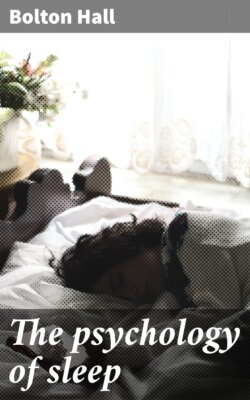Читать книгу The psychology of sleep - Bolton Hall - Страница 7
На сайте Литреса книга снята с продажи.
CHAPTER III
THE TIME OF SLEEP
ОглавлениеTable of Contents
“Women, like children, require more sleep normally than men, but ‘Macfarlane states that they can better bear the loss of sleep, and most physicians will agree with him.’”
H. Campbell.
The amount of sleep, like the amount of food, required by an individual varies greatly, depending largely upon the conditions at the time. Edison, for instance, can go days without sleep when engrossed in some invention, and he has been quoted as saying that people sleep too much, four hours daily being quite sufficient.
In answer to my inquiry, Mr. Edison’s secretary wrote, “Mr. Edison directs me to write you that the statement is correct, that for thirty years he did not get four hours of sleep per day.” Evidently, experience taught him that an average of four hours per day, if taken rightly and at the right time, is enough for him. He keeps a couch in his workroom so as to sleep when he is sleepy. He does not need a clock to tell him when to go to bed, any more than you need a thermometer to tell you when to pull up the blankets.
Edison is not alone in his views on sleep. He made extensive experiments with the two hundred workers in his own factory which convinced him and most of them that the majority slept much too long. The hands seem to have entered willingly into the trials: perhaps their personal regard for him influenced their conclusions. Napoleon Bonaparte and Frederick of Prussia were both satisfied with four hours of sleep,[1] while Bishop Taylor was of opinion that three hours was sufficient for any man’s needs, and Richard Baxter, who wrote “The Saints’ Rest,” thought four hours the proper measure.
Paul Leicester Ford, who was never a strong person, once told me that he found four hours’ sleep enough for all purposes. He did not wish to be understood as saying that four hours’ rest was enough, but four hours’ sleep. He was one of the few who understood the difference between sleep and rest. He frequently rested; his favorite practice being to lie back in a big armchair with a book, and forget the surrounding conditions. The book created a different set of sensations, which, combined with the pause in physical activity, brought a sense of rest to the frail body. He frequently got his four hours of sleep curled up in the big chair, and was then able to go on with the work which in a few short years made him famous. The wife of the late George T. Angell of Boston testifies that for years he seldom slept four hours a night, having found that, for him, more was unnecessary; but, of course, it does not follow that no more is necessary for anyone.
These are not unusual instances, but rather typical cases. History and biography are full of such; each of us can probably mention one or more persons among his own acquaintance who can do well with less than the usual eight hours of sleep, but we have looked upon them as exceptions and perhaps have prophesied that they will feel the evil results later, if not now. We usually select ourselves as the standard for all other persons, or perhaps it is more correct to say that we are prone to select one stage of our own development as a standard, and try to compel even our growing self to conform to that stage. When the crab outgrows his shell it sloughs off, and, so far as we know, he offers no objection, but takes the new shell, which answers his needs better. But we, who consider ourselves infinitely superior to the crab, try to compel ourselves to keep within the bounds of old thoughts, early habits, and outgrown customs after we no longer need them. When we are unfortunate enough to succeed, we rejoice at our cramped souls as the Chinese woman prides herself upon her crushed, cramped, misshapen foot.
The amount of sleep that suited you last year may not suit you to-day. You may really be getting better sleep and so needing less of it: or you may have to make up by quantity for a poorer quality. The test is that, if you are sleepy in waking hours, you need better sleep or more of it. If you are wakeful in sleeping hours, you need less sleep or else you are not getting the right kind. Good sleep is a habit, a natural habit as distinguished from an acquired habit, and when we learn to take it naturally, and in natural amount, we get a great deal more from it. It is fair to assume that purely natural habits, which continue from age to age through all stages of human progress, are essential to human welfare. Otherwise they would drop away from us as many useless physical parts have dropped. If you stop to think of this, you know that it is so; the man in the street and the girl at the ribbon counter do not know, so there is more excuse for them if they misunderstand. It may be that they usually sleep better than you do, and so do not need to know it.
